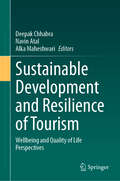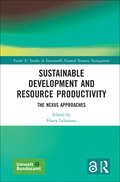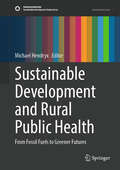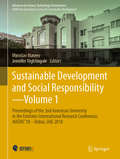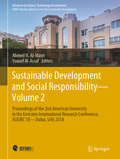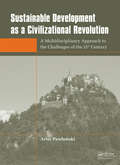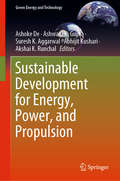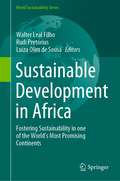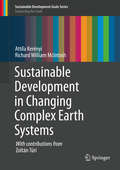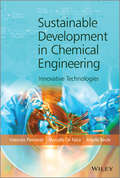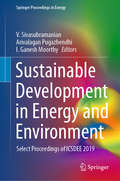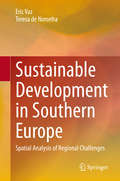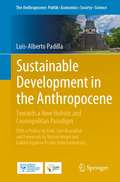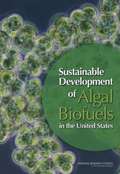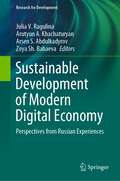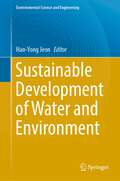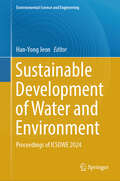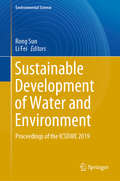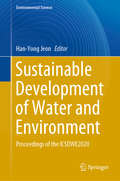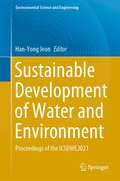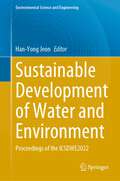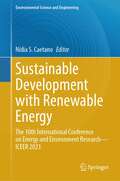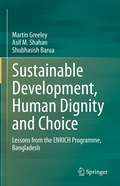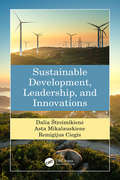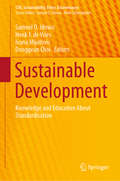- Table View
- List View
Sustainable Development and Resilience of Tourism: Wellbeing and Quality of Life Perspectives
by Deepak Chhabra Navin Atal Alka MaheshwariThis volume examines progress in sustainable and resilient development of niche forms of tourism from a health and wellbeing perspective. It also aims to offer deep and innovative insights on the supporting role of non-pharmaceutical interventions to enhance resilience and wellbeing of visited and visiting communities. A comparative and critical discourse of the role of hard medicine is also offered, from both a core and supplementary perspective, particularly, from eudaimonic and physiologically restorative standpoints. Furthermore, indigenous non-pharmaceutical interventions and spiritual healing mechanisms are discussed in the context of their potential to facilitate long term immunity and happiness. The book conceptually situates health as a fourth pillar of sustainability, and examines its role in stimulating long-lasting transformations rooted in positive psychology, inner transformation and sustainable consumption of organic productsand services. It designs an evolving transformational ‘Quality of Life’ paradigm that strengthens the foundations of health/wellbeing-based sustainable development initiatives and resilience of tourism systems. The work will be of interest to academic, professional, and various public and private stakeholders of tourism such as destination marketing organizations, policy makers, hospitality industries, tour operators, host communities, NGOs, and government agencies.
Sustainable Development and Resource Productivity: The Nexus Approaches (Factor X: Studies in Sustainable Natural Resource Management)
by Harry LehmannThe fourth Factor X publication from the German Environment Agency (Umweltbundesamt, UBA), Sustainable Development and Resource Productivity: The Nexus Approaches explores the interdependencies of sustainable development paths and associated resource requirements, describing and analysing the necessities for a more resource efficient world. The use of and competition for increasingly scarce resources are growing worldwide with current production and consumption patterns of industrialised economies soon to reach the point where the ecosphere will be overtaxed far beyond its limits. Against this background, this volume examines the important initiatives to monitor resource use at the international, EU and national level. The current trends and challenges related to sustainable resource use are discussed, including international challenges for a resource efficient world, megatrends, justice and equitable access to resources. In the second part of the book, contributions examine implementation strategies. They assess the concept known as circular economy and discuss the theory of growth and the role of the financial and education systems. The final section places special emphasis on practical examples. Overall, the book presents concrete ways and examples of achieving more sustainability in practice. Discussing solutions for a more sustainable use of natural resources, this book is essential reading for scholars and students of natural resources and sustainable development and decision-makers and experts from the fields of policy development, industry and civil society.
Sustainable Development and Rural Public Health: From Fossil Fuels to Greener Futures (Sustainable Development Goals Series)
by Michael HendryxThis book offers strategies and solutions for rural communities dependent on fossil fuel economies to enable them to transition to sustainable development. The move to renewable energy development and use is gaining global traction and will inevitably become standard practice in the coming years, and yet vulnerable communities around the world remain dependent on finite resource extraction for local economic activity. What will happen to these communities as the fossil fuel era fades away? Dependence on declining resource extraction economies arises from entrenched short-term interests in political and corporate worlds, and in the knowledge, skills and opportunities that local populations have at their disposal. The edited volume takes a public health perspective by showing how dependence on fossil fuel extraction and processing economies creates not only environmental and economic problems but also public health disparities. More importantly, rather than documentation of problems and obstacles, this book focuses primarily on solutions, on real examples happening right now in communities around the world to take charge of their futures. A series of case studies provide examples of local efforts underway in these communities to create sustainable economic alternatives to fossil fuel dependence. The final section of the volume describes theory-based and empirically grounded development priorities that are needed to make transitions achievable and long-lasting, including improvements in adolescent health and well-being, regenerative development, sustainable food systems, adult education, and community-based leadership. Finally, case studies and development priorities are integrated within a new rural development framework to guide other communities in their own transition efforts. Although the challenges are daunting, the book is ultimately optimistic and forward-looking. Sustainable Development and Rural Public Health: From Fossil Fuels to Greener Futures is essential reading for public health practitioners and researchers, social justice advocates, and students in sustainability studies, environmental justice and related areas. Rural health professionals, community leaders, environmental planners, policy makers, industry leaders, and entrepreneurs also will find this resource useful for their work.
Sustainable Development and Social Responsibility—Volume 1: Proceedings of the 2nd American University in the Emirates International Research Conference, AUEIRC'18 – Dubai, UAE 2018 (Advances in Science, Technology & Innovation)
by Miroslav Mateev Jennifer NightingaleThe book presents high-quality research papers presented at the 2nd American University in the Emirates International research conference, AUEIRC'18, organized by the American University in the Emirates, Dubai, held on November 13th-15th, 2018. The book is broadly divided into four sections: Sustainability and Smart Technology, Sustainability and Social Responsibility, Sustainability, Human Security and Legislation, Sustainability and Education. The topics covered under these sections are sustainable smart technology such as developing green curriculum for information technology, use ultrasonic velocity to predict quality of wheat, improve security features for visa system, factors affecting the cost of production of electricity and desalination plants, impact of smart traffic sensing in smart cities, smart healthcare system, simulation of Grey wolf optimization algorithm in painting digital forensics. The topics covered for sustainability and creative industries such as sustainable concrete production, multimedia applications in digital transformation art, integrating biomimicry principles in sustainable architecture. Sustainability, human security and legislation covered topics of urban performance and sustainable environment, Eco-certification as response on climate change, the criminal offence of tax evasion in law: case study, skills engineering in sustainable counter defense against Cyber extremism, the international law and challenges of trans-boundary water resources governance, the legal status of nuclear energy: case study, sustainable energy development and nuclear energy legislation in UAE, corruption specific safety challenge, environmental management and sustainability, sustainable farming models for desert agro-ecosystems, future directions of climate change, earth and built environment towards new concept of sustainability, institution building from emotional intelligence perspective, virtue ethics, technology and sustainability, the role of humor in a sustainable education, HEIs practices and strategic decisions toward planning for sustainable education programs, TQM in higher education for sustainable future. The papers in this book present high-quality original research work, findings and practical development experiences.
Sustainable Development and Social Responsibility—Volume 2: Proceedings of the 2nd American University in the Emirates International Research Conference, AUEIRC'18—Dubai, UAE 2018 (Advances in Science, Technology & Innovation)
by Ahmed N. Al-Masri Yousef Al-AssafThis book gathers high-quality research papers presented at the 2nd AUE international research conference, AUEIRC 2018, which was organized by the American University in the Emirates, Dubai, and held on November 13th-15th, 2018. The book is broadly divided into two main sections: Sustainability and Smart Business, and Sustainability and Creative Industries. The broad range of topics covered under these sections includes: risk assessment in agriculture, corporate social responsibility and the role of intermediaries, the impact of privatizing health insurance, political events and their effect on foreign currency exchange, the effect of sustainable HR practices on financial performance, sustainability integration in the supply chain and logistics, gender inequality in the MENA economies, the panel data model, the model of sustainable marketing in the era of Industry 4.0, micro-enterprises as a tool for combating unemployment, the impact of financial education and control on financial behavior, measuring financial and asset performance in agricultural firms, a comprehensive strategic approach to sustainability in the UAE, sustainability and project finance, HR analytics, FaD or fashion for organizational sustainability, a conceptual framework of sustainable competitive advantages, psychology of organizational sustainability, Blockchain technology and sustainability, veganism and sustainability, institution building from an emotional intelligence perspective, sustainable concrete production using CWP, occupants’ behavior and energy usage in Emirati houses, the effect of shop lighting on consumer behavior, multimedia applications in digital transformation art, integrating biomimicry principles in sustainable architecture, experimental sustainable practices in fashion education, technology-assisted student-centered learning for civil engineering, and a 10-step design process for architectural design studios. All contributions present high-quality original research work, findings and lessons learned in practical development.
Sustainable Development as a Civilizational Revolution: A Multidisciplinary Approach to the Challenges of the 21st Century
by Artur PawlowskiAs a concept, sustainable development is in conflict with traditional development based upon economic growth. Sustainable development is an attempt to formulate a programme that integrates different aspects (ecological, social, and economical) which were usually considered as separate from each other. Sustainable Development as a Civilizationa
Sustainable Development for Energy, Power, and Propulsion (Green Energy and Technology)
by Ashwani K. Gupta Suresh K. Aggarwal Abhijit Kushari Akshai K. Runchal Ashoke DeThis book comprises state-of-the-art advances in energy, combustion, power, propulsion, environment, focusing on the production and utilization of fossil fuels, alternative fuels and biofuels. It is written by internationally renowned experts who provide the latest fundamental and applied research innovations on cleaner energy production as well as utilization for a wide range of devices extending from micro scale energy conversion to hypersonic propulsion using hydrocarbon fuels. The tailored technical tracks and contributions are portrayed in the respective field to highlight different but complementary views on fuels, combustion, power and propulsion and air toxins with special focus on current and future R&D needs and activities. This book will serve as a useful reference for practicing engineers, research engineers and managers in industry and research labs, academic institutions, graduate students, and final year undergraduate students in mechanical, chemical, aerospace, energy, and environmental engineering.
Sustainable Development in Africa: Fostering Sustainability in one of the World's Most Promising Continents (World Sustainability Series)
by Walter Leal Filho Rudi Pretorius Luiza Olim de SousaThis book serves the purpose of documenting and promoting African experiences on sustainable development, which encompasses both, formal and non-formal education. Sustainable development is very important to Africa, but there is a paucity of publication which documents and promotes experiences from African countries. Due to their complexity, the interrelations between social, economic and political factors related to sustainable development, especially at universities, need to be better understood. There is also a real need to showcase successful examples of how African institutions are handling their sustainability challenges. It is against this background that this book has been produced. It is a truly interdisciplinary publication, useful to scholars, social movements, practitioners and members of governmental agencies and private companies, undertaking research and/or executing projects focusing on sustainability from across Africa. As African nations strive to pursue the UN Sustainable Development Goals, it is imperative to cater for the information needs seen across the continent and foster the dissemination of experiences and case studies, which may support both, on-going and future efforts. The scope of the book is deliberately kept wide, and we are looking for contributions across the spectrum of sustainable development from business and economics, to arts and fashion, administration, environment, languages and media studies.
Sustainable Development in Changing Complex Earth Systems (Sustainable Development Goals Series)
by Attila Kerényi Richard William McIntoshThis book applies system theory to analyze the operation and structure of the complex earth surface system, including the interactions between society and nature that cause environmental degradation and threats to human populations. The possible ways to harmonize the operation of a global society as a complex system using the United Nation sustainable development goals are investigated, as well as the major efforts currently implemented to achieve this objective and why many are unsuccessful. Readers will learn this material through case studies that assess the essential conditions required to occupy a planet sustainably, and examine the complex interactions between society and nature in the atmosphere, hydrosphere, biosphere, and outer layers of the lithosphere. The book is written for undergraduate students in geography, earth sciences, environmental sciences, and ecology, and will also appeal to environmental agency employees, nature protection representatives, teachers, and researchers.
Sustainable Development in Chemical Engineering
by Marcello De Falco Angelo Basile Vincenzo PiemonteSustainable development is an area that has world-wide appeal, from developed industrialized countries to the developing world.<P><P> Development of innovative technologies to achieve sustainability is being addressed by many European countries, the USA and also China and India. The need for chemical processes to be safe, compact, flexible, energy efficient, and environmentally benign and conducive to the rapid commercialization of new products poses new challenges for chemical engineers. This book examines the newest technologies for sustainable development in chemical engineering, through careful analysis of the technical aspects, and discussion of the possible fields of industrial development. <P>The book is broad in its coverage, and is divided into four sections: Energy Production, covering renewable energies, innovative solar technologies, cogeneration plants, and smart grids Process Intensification, describing why it is important in the chemical and petrochemical industry, the engineering approach, and nanoparticles as a smart technology for bioremediation Bio-based Platform Chemicals, including the production of bioethanol and biodiesel, bioplastics production and biodegradability, and biosurfactants Soil and Water Remediation, covering water management and re-use, and soil remediation technologies Throughout the book there are case studies and examples of industrial processes in practice.
Sustainable Development in Energy and Environment: Select Proceedings of ICSDEE 2019 (Springer Proceedings in Energy)
by V. Sivasubramanian Arivalagan Pugazhendhi I. Ganesh MoorthyThis book presents select peer-reviewed proceedings of the International Conference on Sustainable Development in Energy and Environment (ICSDEE) 2019. The focus is on novel research in renewable energy resources and environmental issues and their implementation in augmenting sustainable development. This book includes chapters on solutions to problems faced by countries across the globe in the energy sector, pollution treatment processes, and other socially relevant topics like the possibility of extracting energy from the inexhaustible waste stream, waste disposal, waste management etc. This book will be useful for students, researchers as well as professionals interested in sustainable technologies, green energy, and biotechnology.
Sustainable Development in Southern Europe: Spatial Analysis of Regional Challenges
by Eric Vaz Teresa de NoronhaThis book discusses the future and present regional challenges of southern Europe, adopting a multidisciplinary perspective concerning planning, regional development, the role of innovation and sustainability of cities. It offers as such an insight into the current status quo of regional development and territorial dynamics of a region of growing world-interest.Southern Europe has significantly changed over the last decades. At a regional level, key issues such as local and regional governance, sustainability, and preservation of heritage have presided as prime directives within the umbrella of the European Union. The recession had devastating consequences on the perception and the economies of southern Europe. However, the resilience and capacity of southern Europe to reinvent itself have been shown over the last decade. Southern Europe has since antiquity been a cradle of invention, innovation, and regional development, that under adequate and visionary governance may bring a growing engine towards sustainability.
Sustainable Development in the Anthropocene: Towards a New Holistic and Cosmopolitan Paradigm (The Anthropocene: Politik—Economics—Society—Science #29)
by Luis-Alberto PadillaIn the Anthropocene sustainable development responds to socio-economic, environmental and political crises provoked by humankind due to global warming and the great acceleration of human intervention in ecosystems. This book introduces readers to current debates on sustainable development and to a holistic and multidisciplinary approach. Regional integration and supranational institutions are fundamental for sustainable development. The democratisation of the international system requires a new multilateralism. Global problems of demography, economic ideology of unlimited growth, the prevailing technocratic paradigm, consumerism, problems of waste, fossil fuels, industrial food production, use of fertilisers, water management and climate change are discussed, and the importance of multilateral agreements for security, sustainable peace and development is explored. This planetary crisis may be solved by international cooperation based on the UN sustainable development goals.This book - provides a concise synthesis of the main subjects of sustainable development studies- links development studies to multilateral diplomacy as practised by UN bodies and organisations- gives a new holistic and multidisciplinary approach to environmental and social sciences in the Anthropocene epoch.
Sustainable Development of Algal Biofuels in the United States
by National Research Council Board on Agriculture and Natural Resources Division on Engineering and Physical Sciences Division on Earth and Life Studies Board on Energy and Environmental Systems Committee on the Sustainable Development of Algal BiofuelsBiofuels made from algae are gaining attention as a domestic source of renewable fuel. However, with current technologies, scaling up production of algal biofuels to meet even 5 percent of U.S. transportation fuel needs could create unsustainable demands for energy, water, and nutrient resources. Continued research and development could yield innovations to address these challenges, but determining if algal biofuel is a viable fuel alternative will involve comparing the environmental, economic and social impacts of algal biofuel production and use to those associated with petroleum-based fuels and other fuel sources. Sustainable Development of Algal Biofuels was produced at the request of the U.S. Department of Energy.
Sustainable Development of Modern Digital Economy: Perspectives from Russian Experiences (Research for Development)
by Julia V. Ragulina Arsen S. Abdulkadyrov Arutyun A. Khachaturyan Zoya Sh. BabaevaThe digital economy is a new direction in which the modern global economic system is now heading. This book seeks to adapt the digital economy concept to the priorities of humanity, including the implementation of global development goals. The authors develop and substantiate scientific and methodological criteria for assessing the sustainability of the modern digital economy, and offer several concrete recommendations for improving the concept of the digital economy by incorporating global development goals.
Sustainable Development of Water and Environment (Environmental Science and Engineering)
by Han-Yong JeonThis book aims to offer new scientific concept in the field of water and environment. The main purpose of this book is to exchange some of the latest research findings and educational information on the water and environment in order to take important measures to protect water resources and the environment for future generations in accordance with the principles of sustainable development. The book welcomes all related research and review papers and hopes ICSDWE can positively impact our world and provide a better future for all, including the improvement to the quality of life.
Sustainable Development of Water and Environment: Proceedings of ICSDWE 2024 (Environmental Science and Engineering)
by Han-Yong JeonThis book aims to introduce pioneering scientific concepts in water and environmental studies, fostering the exchange of cutting-edge research findings and educational insights. With a focus on sustainable practices in water resource management, quality, and pollution control, the ICSDWE conference addresses the vital linkages between environmental sustainability, climate change, and water-related issues. This year’s conference will focus on key themes such as climate change and water security, microplastics in freshwater ecosystems, sustainable groundwater development, transboundary water conflicts and cooperation, and environmental impact of desalination. By advocating for significant measures aligned with sustainable development principles, ICSDWE strives to safeguard water resources and the environment for future generations. We extend a warm welcome to all related research contributions, aspiring for ICSDWE to positively impact our world and enhance overall quality of life. This year, the ICSDWE conference will have its 7th edition. Through its previous editions, the conference has also contributed to the academic and practical discourse by publishing proceedings, policy briefs, and recommendations that serve as resources for researchers, practitioners, and policymakers alike. With each edition, the conference has reinforced its commitment to advancing sustainable development goals and addressing the most pressing environmental challenges of our time. Overall, the conference has established itself as a significant event for sharing knowledge, fostering partnerships, and promoting sustainable practices.
Sustainable Development of Water and Environment: Proceedings of the ICSDWE 2019 (Environmental Science and Engineering)
by Rong Sun Li FeiThis book covers the full spectrum of water and environment conservation, offering management lessons, identifying the barriers to transformative change, and then presenting agendas and initiatives for sustainable global water and environment management. Water is a unique resource and is vital to human beings and ecosystems. At the same time, it is a driver of growth and development. However, in a changing world factors such as rapid population growth and urbanization are having an increasing impact on water and the environment, and managing critical water resources sustainably represents an unprecedented and urgent challenge. As such, the book describes innovative approaches that can be used to support the operationalization and delivery of sustainable water and environment management. ICSDWE 2019 is dedicated to sustainable water and environment, with a focus on the water resources management, wastewater treatment and environmental protection. Sharing current knowledge and recent developments, experiences and lessons learned, it stimulates discussion and reflection, to promote a paradigm shift toward sustainable water and environment management.
Sustainable Development of Water and Environment: Proceedings of the ICSDWE2020 (Environmental Science and Engineering)
by Han-Yong JeonThis book focuses on water resources and the economic, financial, social and environmental impacts (ICSDWE) of global warming and climate change. It discusses the links between these aspects and presents cutting-edge research, technology, and practice in these fields. The book is a valuable resource for students and researchers at government organizations, academic institutions, and NGOs.
Sustainable Development of Water and Environment: Proceedings of the ICSDWE2021 (Environmental Science and Engineering)
by Han-Yong JeonThis book addresses the improvement and dissemination of knowledge on methods, policies and technologies for increasing the sustainability of development by de-coupling growth from natural resources and replacing them with knowledge-based economy, taking into account its economic, environmental and social pillars, as well as methods for assessing and measuring sustainability of development, regarding water and environment. This book gathers scholar and experts in related fields. All attendees from a vast range of companies, universities and government institutions acquire advanced technical knowledge and are introduced to new fields through discussions that focus on their own specialties as well as a variety of interdisciplinary areas. The authors hope most of scholars can find what they really need in this book.
Sustainable Development of Water and Environment: Proceedings of the ICSDWE2022 (Environmental Science and Engineering)
by Han-Yong JeonThis book of ICSDWE2022 aims to advance the understanding of both the fundamentals of related fields in sustainable development of water and environment and its application to the solution of challenges and problems in engineering. The committee of ICSDWE2022 gathers scholars and experts in related fields both at home and abroad. Under the guidance of the committee, we are confident to the publication of high-quality papers on all aspects of water and environment. The book features graduate-level texts and professional books in related fields. We hope that most scholars, researchers, and engineers can find what they really need in our book.
Sustainable Development with Renewable Energy: The 10th International Conference on Energy and Environment Research—ICEER 2023 (Environmental Science and Engineering)
by Nídia S. CaetanoThis proceedings book contains the full papers of the 10th edition of the International Conference on Energy and Environment Research, ICEER 2023, that took place in Madrid, Spain during October 7–9, 2023. ICEER 2023 is a joint organization of the School of Engineering (ISEP) of the Polytechnic of Porto (P.Porto) and the SCIEI, with collaboration of the Dipartimento di Ingegneria of the Università degli studi "Roma Tre", CIETI and LEPABE research groups. This book includes all the well prepared full papers presented at ICEER 2023.
Sustainable Development, Human Dignity and Choice: Lessons from the ENRICH Programme, Bangladesh
by Martin Greeley Asif M. Shahan Shubhasish BaruaThe Enhancing Resources and Increasing Capacities of Poor Households Towards Elimination of their Poverty (the ENRICH) programme is being implemented by Palli Karma-Sahayak Foundation (PKSF), which is a government-established Foundation and implements its programmes through Partner NGOs. The efforts are concerned with the perspective of eradicating poverty, aiming at enabling individuals to live a life that is humanly dignified. In doing so, the ENRICH programme focuses on creating opportunities for them to exercise freedom in determining their choices. The approach based on this understanding, i.e. poverty reduction/elimination and economic improvement strategies, coupled with interventions that ensure access to universal human rights, should promote freedom of choice leading to a dignified life and has shaped the programme contents and implementation framework. The ENRICH programme has been conceptualized and promoted by the current Chairman of PKSF, Dr. Qazi Kholiquzzaman Ahmad, who was appointed to the position in November 2009. In essence, the ENRICH programme is innovative, integrated, human-centred, taking into consideration the multidimensionality of human life and living, involving socio-economic and environmental dimensions. It focuses on human capability, both individual and collective and social capital formation to facilitate the way forward, the ultimate goal being humanly dignified living of all those who are deprived of this fundamental call of humanity.
Sustainable Development, Leadership, and Innovations
by Dalia Streimikiene Asta Mikalauskiene Remigijus CiegisThis book deals with the main challenges of sustainable development and the role of sustainable business and corporate social responsibility in implementing these challenges through sustainable leadership and innovations. It includes the economic, social, and environmental dimensions of sustainability and emphasizes the importance of achieving a socio-environmental balance in society. The theoretical frameworks and insights from sustainable development implementations on macro and micro levels, as well as the practical examples and case studies provided to introduce the concept of sustainable leadership and its impact on sustainable business development, are a scientific novelty in the field of sustainability. The book is comprised of six interconnected chapters that sequentially reveal the principal provisions of sustainable development, corporate social responsibility, and sustainable leadership, together with their correlations. Features: • Provides cutting-edge examples and case studies of sustainable leadership, viewed as the most significant means for the creation of sustainable organizational culture • Includes case studies on the economic, social, and environmental dimensions of sustainability • Addresses scientific aspects of sustainable development and its challenges • Discusses issues of sustainable development at different scales, ranging from macro to mirco levels • Provides policy implications for sustainable business development The theoretical framework and practical case studies presented in Sustainable Development, Leadership, and Innovations make it an invaluable resource and guide to both the academic and business communities. Business leaders, policy makers, and other professionals, as well as academics and graduate students, will all benefit greatly from this text.
Sustainable Development: Knowledge and Education About Standardisation (CSR, Sustainability, Ethics & Governance)
by Samuel O. Idowu Henk J. de Vries Ivana Mijatovic Donggeun ChoiThis book examines education about standardization in the context of sustainable management. It shows the role of standardization education in the global economy, and in markets, industries and businesses. The book presents knowledge on standardization for sustainable management, describes measures that can be taken to stimulate it, and highlights strategies for teaching and disseminating the concept. Subsequently presenting a number of best practices and case studies, the book seeks to align theory and practice. For researchers, this is the first academic publication that interconnects the concepts of sustainability, standardization and education. For professionals in the area of sustainability it shows that standardization is an essential instrument for enhancing sustainability for which proper education is needed. For standardization professionals the book reveals the links to sustainability and it shows not only the importance of education about standardization but also how this can be organized, and finally, for universities, the book shows that standardization deserves to be included in the curriculum, and it provides guidance and best practice examples about how this can be done.
